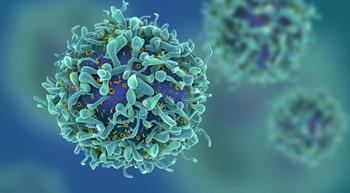
From Blink-182’s bassist Mark Hoppus discussing his cancer experience in an upcoming book to Bruce Sutter, a Hall-of-Fame pitcher and Cy Young winner, dying of the disease, here’s what’s happening in the cancer space this week.

From Blink-182’s bassist Mark Hoppus discussing his cancer experience in an upcoming book to Bruce Sutter, a Hall-of-Fame pitcher and Cy Young winner, dying of the disease, here’s what’s happening in the cancer space this week.

Investigators of an expanded clinical trial have administered an investigational CAR-T cell therapy to the first patient with blood cancer.

The CAR T Together initiative is geared toward improving the development of allogeneic CAR-T cell therapies for patients with cancer.

From “Chicago Med” actress Marlyne Barrett announcing her gynecologic cancer diagnosis to a New York City-based news team walking in honor of their former news director who died of glioblastoma, a form of brain and spinal cord cancer, here’s what’s happening in the cancer space this week.

Patients with blood cancer who have higher levels of neurofilament light chains — which indicate brain injury — were found to be more likely to develop neurotoxicity after CAR-T cell therapy, according to recent research.

I used to love October, but after being diagnosed with cancer on Oct. 12 — twice — I dread the month.

The Food and Drug Administration issued a statement about the incidence of new cases of rare cancers that have occurred in the scar tissue around breast implants.

Actress Jane Fonda announced that she has been diagnosed with non-Hodgkin lymphoma and will be receiving chemotherapy to treat the blood cancer.

The combination treatment demonstrated survival and safety results similar to those of chemotherapy for patients with advanced, untreated follicular lymphoma.

The FDA has allowed the manufacturer of emavusertib to continue a phase 1/2 study investigating effects of the treatment in patients with lymphoma.

From ESPN analyst Dick Vitale announcing he is cancer-free months following a lymphoma diagnosis to a Speedo-clad race in South Africa to raise awareness for cancer, here’s what’s happening in the oncology space this week.

A representative of the company developing the investigational CAR-T cell therapy noted that they hypothesize that the combination “has the potential to further enhance efficacy and provide patients with a chemotherapy-sparing, second-line treatment option.”

The tablet version of Calquence, which was approved by the FDA for the treatment of chronic lymphocytic leukemia, small lymphocytic leukemia and relapsed/refractory mantle cell lymphoma, may be taken alongside other drugs to reduce gastric-related side effects.

When my grandmother passed, I noticed my aunt was ruder than usual, and I wondered if I was like that during my cancer experience... and if the pain I was going through excused that behavior.

From Dick Vitale receiving the Jimmy V Award at the 2022 ESPYs to a former triathlon champion opening up about his cancer experience, here’s what’s happening in the cancer space this week.

A first-in-human trial is investigating the safety and efficacy of the novel CAR-T cell therapy in patients relapsed or refractory T-cell acute lymphoblastic leukemia/lymphoblastic lymphoma.

The manufacturer of the novel CAR-T cell therapy announced it terminated an early-phase trial investigating the treatment’s efficacy after there was a lack of benefit in patients with relapsed or refractory T-cell lymphoma, a type of blood cancer.

The FDA approval of Breyanzi, a novel CAR-T cell therapy, provides many patients with lymphoma a new treatment option that can be used earlier in the course of their disease, according to an expert.

The FDA approval of Breyanzi, a CAR-T cell therapy, offers patients with relapsed/refractory lymphoma the opportunity for long-term remission, and hope for a cure, one expert said.

From Robin Roberts’ personal message about her partner, Amber Laign’s cancer, to a dancing group inspired by an “America’s Got Talent” contestant who died of cancer, here’s what is happening in the cancer space this week.

Kymriah, a CAR-T cell therapy, was approved by the Food and Drug Administration for the treatment of patients with pretreated, relapsed/refractory follicular lymphoma.

Losing my hair due to cancer treatment was mentally and physically painful, but I learned a few tips and tricks along the way.

When you put your feelings out there in cancer support groups — be it in-person or virtual — you’re opening your ideas up to others’ interpretation, and some might not like what you have to say.

Watching my sister undergo cancer treatment made me want to become a nurse, though after she was re-diagnosed, I’ve had to step away from that career path.

I can’t stand the “battle language” of cancer, including terms like “cancer warrior” and “losing the battle” with the disease.